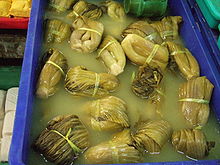| Suan cai | |||||||||||||||||||||
|---|---|---|---|---|---|---|---|---|---|---|---|---|---|---|---|---|---|---|---|---|---|
 A tub of suancai made from Chinese mustard. | |||||||||||||||||||||
| Chinese | 酸菜 | ||||||||||||||||||||
| Hanyu Pinyin | suān cài | ||||||||||||||||||||
| Literal meaning | Sour vegetable | ||||||||||||||||||||
| |||||||||||||||||||||
| Alternative Chinese name | |||||||||||||||||||||
| Chinese | 鹹菜 | ||||||||||||||||||||
| Hanyu Pinyin | xián cài | ||||||||||||||||||||
| Literal meaning | Salty vegetable | ||||||||||||||||||||
| |||||||||||||||||||||
Suancai (also called suan tsai and Chinese sauerkraut; lit. 'sour vegetable') is a traditional Chinese pickled Chinese cabbage (napa cabbage) or Chinese mustard, used for a variety of purposes. Suancai is a unique form of paocai, due to the ingredients used and the method of production.